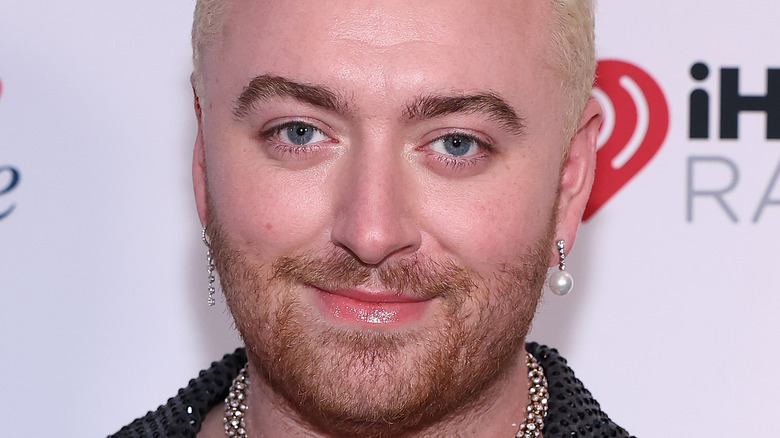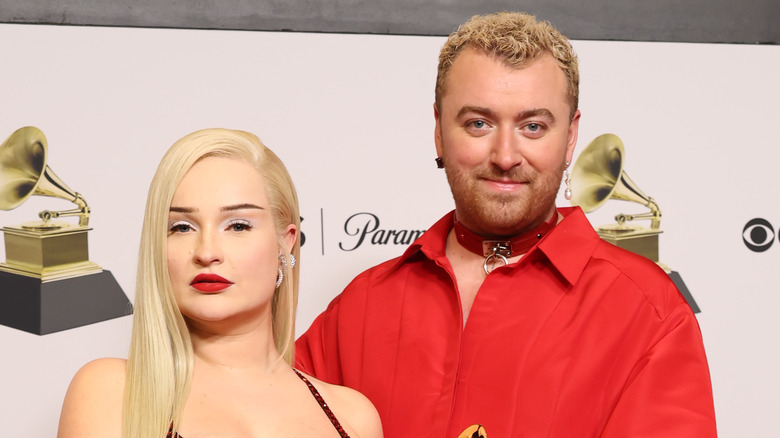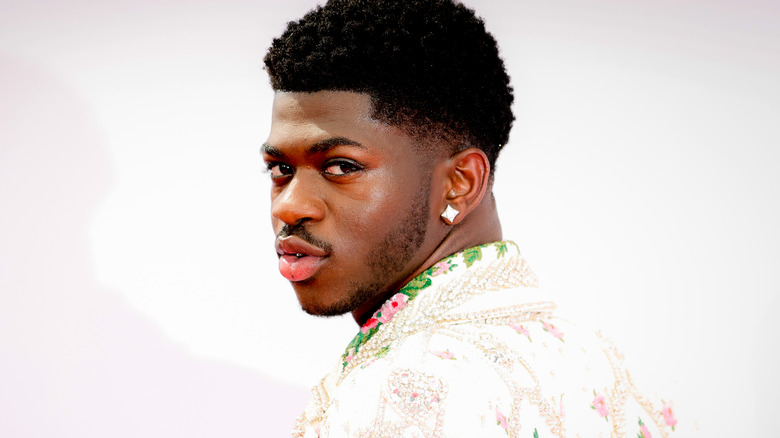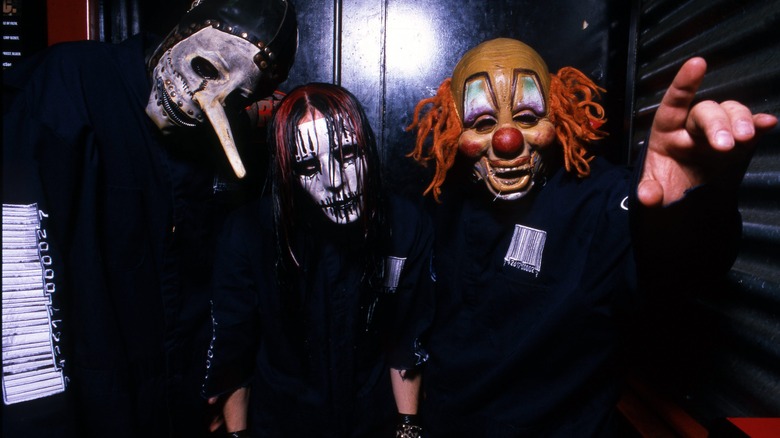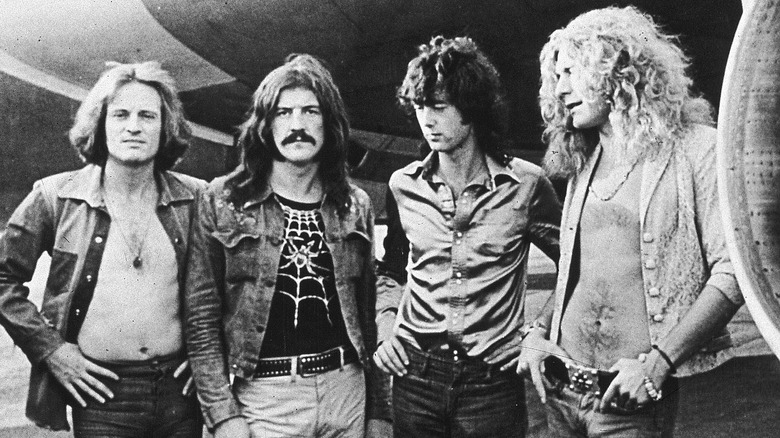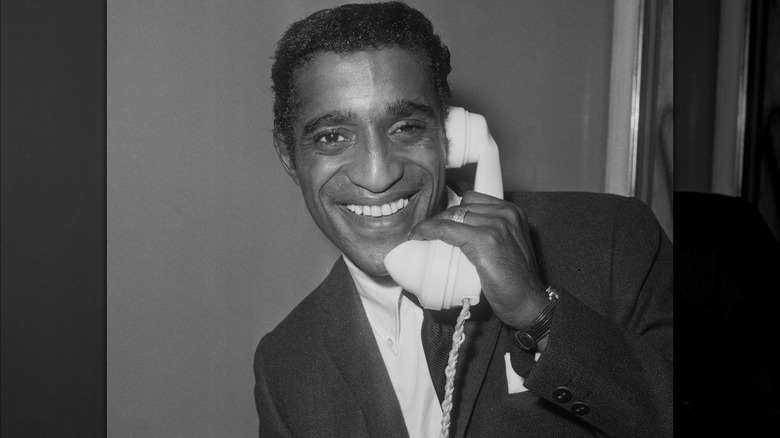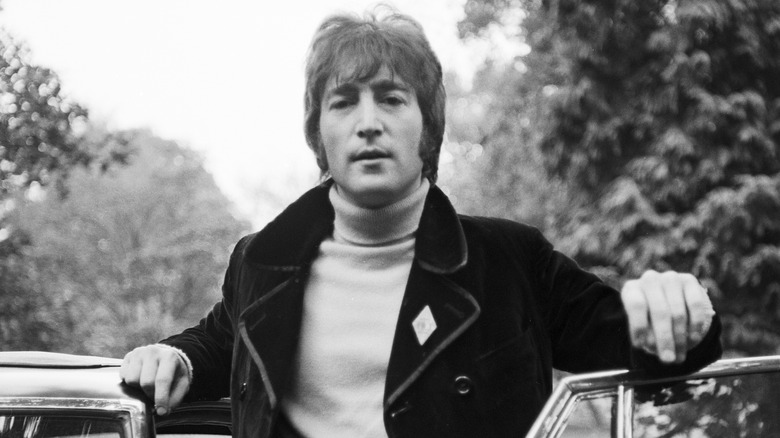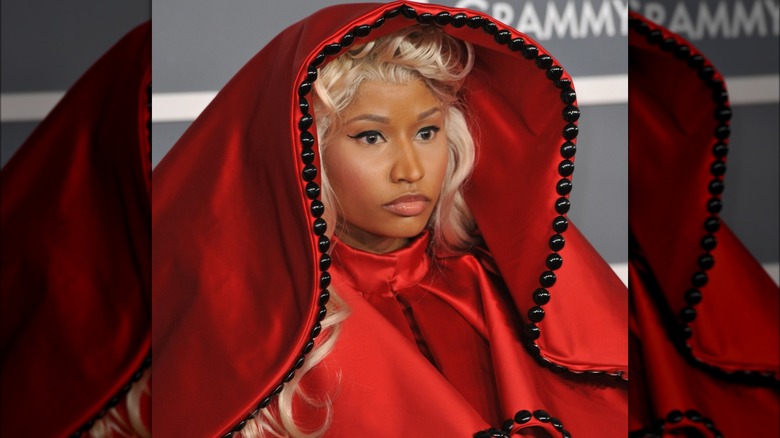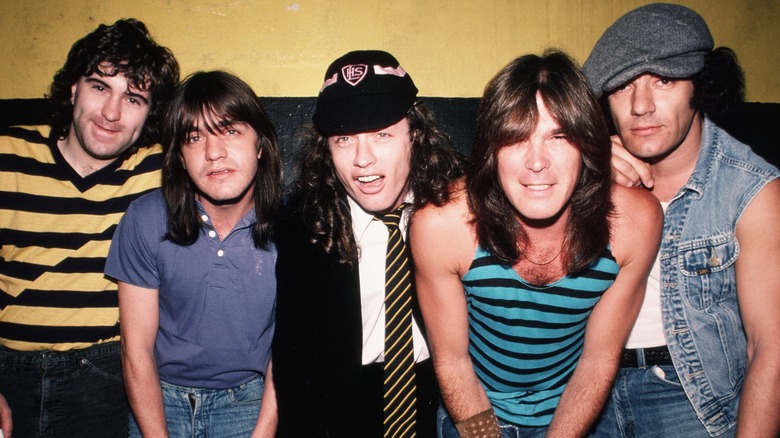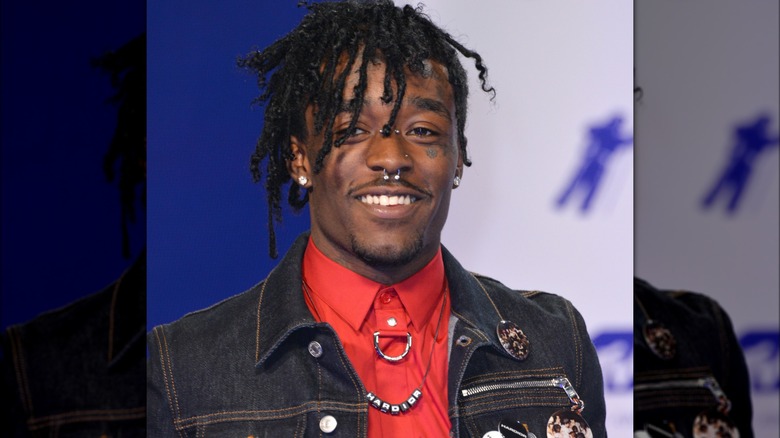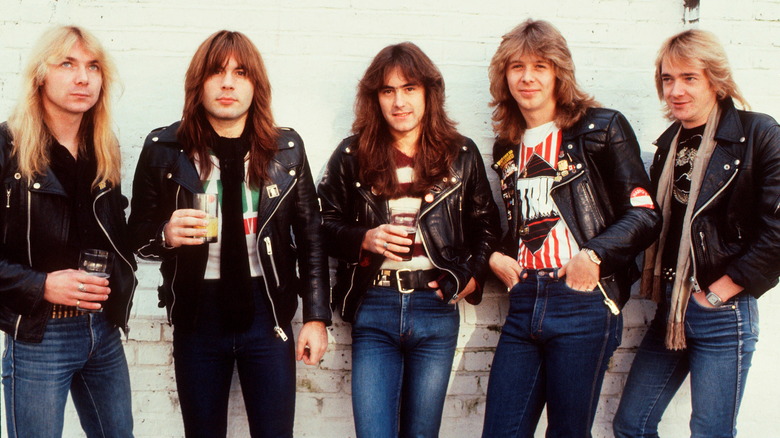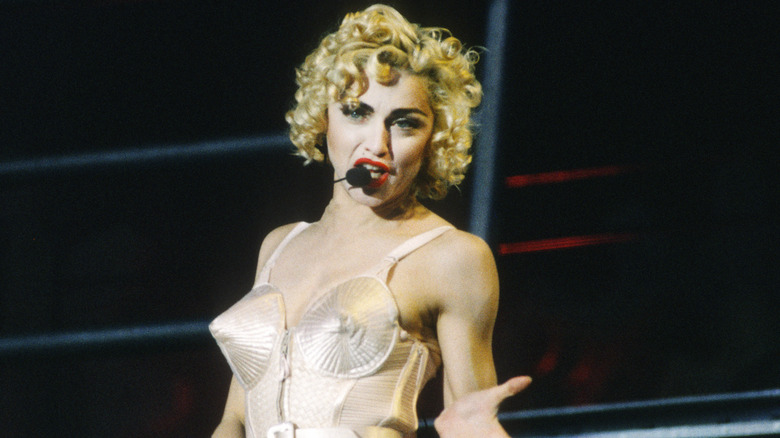Musicians Who've Been Blasted For Being 'Unholy': From Sam Smith To Madonna
Musicians often have larger-than-life personas, giving legendary performances that spark reactions for years. When they incorporate religious imagery and bloody visuals in their acts, reactions can be mixed, with some people believing there's something sinister underneath. Case in point: Ozzy Osbourne will never live down the time he bit the head off a live bat during a show with Black Sabbath. Religious groups jumped on the incident to proclaim the evils of heavy metal music. Even Beyoncé and Jay-Z, long rumored to be part of the Illuminati, couldn't escape speculation that their daughter Blue Ivy's name had a decidedly diabolical meaning (when written backwards, of course).
Their voices might be angelic, but some people believe the following artists take part in some pretty dark behavior. These musicians have had a devil of a time fighting accusations that they're in league with, well, the devil. Keep reading to find out which musicians have stirred up religious controversies over the years, from the so-called "Satanic panic" of the '80s to modern-day scandals.
Was Sam Smith and Kim Petras' Grammys performance unholy?
Sam Smith and Kim Petras had a triumphant night at the 2023 Grammy Awards, where they made history by winning the best pop duo/group performance award for "Unholy": Smith was the first non-binary artist and Petras was the first transwoman to ever succeed in that category. "This is a huge moment for me. Sam, thank you," Petras gushed as the two accepted the coveted trophy. "You're a true angel and hero in my life. And I love you."
However, their performance of this No. 1 hit single unfortunately received some backlash among conservatives over the use Satanic visuals, like Smith's red top hat with horns and a fiery stage — sparking unfounded claims that the musicians were literally worshipping the devil and deliberately provoking Christians and right-wing Americans. Republican Senator Ted Cruz responded to a tweet alleging that Smith was trying to convert children to Satanism, writing: "This...is...evil." While speaking about whether the performers were intentionally trying to divide their audience, Megyn Kelly pointed out on her show that one of the Grammys' sponsors, Pfizer, didn't exactly help matters. "It's an amazing troll, really, of the right wing," she claimed.
It's worth noting that Church of Satan magister David Harris didn't think the visuals were anything new, further telling TMZ of the backlash, "It's sad when politicians on a national stage use someone's religion as a punchline." Meanwhile, Madonna praised Petras and Smith for stoking controversy as she introduced their number, saying, "If they call you shocking, scandalous, troublesome, problematic, provocative, or dangerous, you are definitely onto something."
Lil Nas X shut down the religious backlash
Lil Nas X became the target of religious backlash in 2021 when he released his song "Montero (Call Me By Your Name)." Several conservative commentators and Christian pastors alike complained about the rapper-singer's homoerotic Biblical imagery in the music video, which saw Lil Nas X slide down a pole to hell and give the devil a lap dance. He followed up the controversy by releasing his so-called (and short-lived) "Satan shoes," 666 pairs of Nike Air Max 97s that featured pentagrams and a drop of human blood. Created in collaboration with MSCHF Product Studio, Inc., these sneakers immediately sold out, but resulted in a trademark infringement lawsuit from Nike — and also further enraged the music star's right-wing critics. "We are in a fight for the soul of our nation," South Dakota Governor Kristi Noem warned her Twitter followers. "We have to win."
The pop star fired back at the accusations on Twitter, insisting that nobody had pressured him into making the video, while further arguing that he didn't have to maintain a family-friendly image just because "Old Town Road" had previously been a hit with kids. "I am an adult," Lil Nas X wrote. "I am not gonna spend my entire career trying to cater to your children. That is your job." He also pointed out the hypocrisy of politicians focusing on his content rather than real issues of life and death, tweeting: "There is a mass shooting every week that our government does nothing to stop. Me sliding down a CGI pole isn't what's destroying society."
Lady Gaga's Judas was 'not meant to be an attack on religion'
Lady Gaga's songs "Alejandro" and "Judas" were both condemned by religious groups like The Catholic League for Religious and Civil Rights, especially when a scandalous music video for the latter was released around the same time as Easter in 2011. The group's president, Bill Donahue, alleged to the press that her appearance as Mary Magdalene and a nun swallowing a rosary was a deliberate attempt to shock her audience. "This isn't random, we are getting closer to Holy Week and Easter," he insisted (via The Hollywood Reporter), adding that as someone who grew up Catholic, Gaga was supposedly "trying to rip off Christian idolatry to shore up her talentless, mundane and boring performances."
For her part, Gaga didn't seem to take these critiques too seriously, quipping to E! News (via MTV News), "In my opinion, the only controversial thing about this video is that I'm wearing Christian Lacroix and Chanel in the same frame." The Mother Monster continued, "This video is not meant to be an attack on religion. I respect and love everyone's beliefs. I'm a religious and spiritual person who's obsessed with religious art."
Unfortunately, the speculation around Gaga's supposedly sacrilegious activities only increased a year later, when a maid accused the pop star of leaving a lot of blood behind in UK hotel room bath. As reported by The Sun (via PopCrush), online conspiracy theories were further fueled by the staff member alleging that Gaga had been "bathing in blood as part of a Satanic ritual," which she denied.
Slipknot was accused of promoting Satanism
It might not come as any surprise that the heavy metal band Slipknot has been criticized by Christian institutions, thanks to their provocative style. In 2005, they were accused of Satanism by the Greek Orthodox Church, who tried to ban them from playing a concert in Athens. As reported by AP News (via MTV News), officials from the church argued that "public institutions must do their duty and protect Greek citizens from any public event that promotes Satanism." They insisted that there must be a Satanic explanation for the appearance of Slipknot, observing that "the members of the band have a shocking appearance, wearing black uniforms and masks that look like skulls." Despite their concerns, the show went ahead as planned with the band performing at the Lykavittos Theatre.
All that said, the Greek Orthodox Church probably wasn't aware that one of Slipknot's original members, Donnie S. Steele, was actually a Christian who reportedly left the band because the group conflicted with his own religious views, as detailed in Joel McIver's 2001 biography "Slipknot: All Hope Is Gone." But in a 2010 interview with MFKR1.com, Steele explained that he didn't have any personal disagreements with the other band members. "I left for a few reasons," he clarified, adding, "I had a lot on my mind spiritually and other areas of my life that needed attention." The following year, Steele even joined Slipknot on tour as a replacement bassist.
The moral panic surrounding this Led Zeppelin classic
Led Zeppelin guitarist Jimmy Page was such a big fan of Aleister Crowley that he bought the occultist's former house in the Scottish Highlands during the early '70s. His interest in this subversive figure led many to assume that the band was trying to spread Satanism through their music, sparking a moral panic around hit songs like "Stairway to Heaven."
As detailed by Salon, Michigan minister Michael Mills was apparently the first to spread the theory of backmasking in 1981, alleging that there were hidden messages on "Stairway to Heaven" that would indoctrinate children into devil-worshipping and could be heard if the record was played backward. He argued on Christian radio that the subconscious brain could pick up on these short phrases, which supposedly included "Master Satan," "Serve me," and "There's no escaping it." In reality, backmasking has been widely debunked.
"Who on Earth would have ever thought of doing that?" Led Zeppelin's frontman Robert Plant later rhetorically asked Rolling Stone (via the Los Angeles Times), observing that these conspiracy theorists must "have a lot of time on [their] hands to even consider that people would do that." He also pointed out a fundamental flaw in the logic of these religious fundamentalists, saying, "I figure if backward masking really worked, every record in the store would have 'buy this album' hidden in it."
Sammy Davis Jr.'s short-lived stint with the Church of Satan
Sammy Davis Jr. might seem like an unlikely ambassador for Satanism: the multi-talented performer famously converted to Judaism in the mid-1950s and won over mainstream audiences as one of the most popular members of Hollywood's Rat Pack alongside Frank Sinatra and Dean Martin. He briefly joined the Church of Satan in 1968 after being invited by some young actors to a party he later described as a mix of "dungeons and dragons and debauchery" in his 1989 memoir "Why Me?: The Sammy Davis, Jr. Story." As the church itself clarified, it was founded to celebrate the idea of Satan as a symbol of personal freedom, rather than literally worshipping anything — but founder Anton LaVey remained a controversial figure. "Each of them had one fingernail painted red, an inside thing among Satanists to identify themselves to each other," Davis explained of the group. "I was curious. Evil fascinated me. I felt it lying in wait for me. And I wanted to taste it."
Davis even tried to make a TV series in 1973 called "Poor Devil" about a demon trying to recruit souls for Lucifer, who would be played by Christopher Lee. Religious groups protested the show, which ended up being canceled after the pilot was filmed. The consummate entertainer didn't stick with the Church of Satan in the long run either. "One morning after a 'coven' that wasn't quite fun and games, without anyone telling me to, I got some nail polish remover and I took off the red fingernail," Davis recalled.
John Lennon caught flack for criticizing organized religion
John Lennon once annoyed churchgoers when he was in the Beatles, prompting some in the South to burn their records and even send death threats. In a 1966 interview with journalist Maureen Cleaver of the London Evening Standard, the musician had observed that religion was on the decline among young people. "Christianity will go," he insisted (via The Beatles Ultimate Experience). "It will vanish and shrink. I needn't argue about that; I know I'm right and I will be proved right. We're more popular than Jesus now." Lennon went on to clarify that he was a fan of Jesus Christ, but not organized religion.
The remark didn't cause much outcry at first when the interview was published in the UK, but the American magazine Datebook took part of the quote out of context and put it on its cover when it republished the story. In response, as detailed by Rolling Stone, a couple of radio DJs in Birmingham, Alabama opted not to play the group's hits on the air as part of their "Ban the Beatles" campaign. This began a trend across the Bible Belt, where people started gathering to throw their Beatles records into bonfires. When the Beatles embarked on their American tour later that year, they were even protested by the Ku Klux Klan.
For his part, Lennon denied on multiple occasions that he had been trying to offend anyone, adding that he could have made the comparison about television being more popular than Jesus instead.
Nicki Minaj acted out an exorcism at the Grammys
Nicki Minaj made headlines around the world when she acted out an exorcism during her Grammys performance of her hit single "Roman Holiday" in 2012, which was promptly condemned by the Catholic League. The rapper-singer started the song by pretending to be in confession with a Catholic priest and ended up writhing and levitating in front of massive stained-glass windows, surrounded by her backup dancers in robes.
"Perhaps the most vulgar part was the sexual statement that showed a scantily clad female dancer stretching backward while an altar boy knelt between her legs in prayer," Catholic League president Bill Donohue argued in a statement (via the Los Angeles Times), going on to claim, "Whether Minaj is possessed is surely an open question, but what is not in doubt is the irresponsibility of the Recording Academy."
Minaj responded by explaining that she was performing as her alter-ego, Roman, and comparing her performance to other media. "I've been doing theater my whole life ... so I'm confused," she told "Extra," adding that this performance was deliberately scripted to depict her character going to a monastery, rather than just invoking religious imagery for no reason. "What I do is art. If you go look at a painting, and they have something that seems a little offensive, it's still art." Minaj also insisted, "I would never be purposely offensive to anyone."
AC/DC's inadvertent connection to the Night Stalker
AC/DC was one of the bands whose reputations took a blow during the Satanic panic of the '80s. After Los Angeles police arrested serial killer Richard Ramirez, known as the Night Stalker, in August 1985, the news spread that he had been seen wearing a black AC/DC baseball hat while he was out at night following his victims. Newspapers printed lyrics from the Australian band's song "Night Prowler," suggesting that the musicians may have inspired their fan, Ramirez, to commit his violent crimes. There was also a rumor that the band's name stood for "Anti-Christ/Devil's Child," as a reference to their alleged Satanism.
That November, bass player Cliff Williams spoke out about the criticism. "I was p***ed off. It was ridiculous. The guy was obviously a nut case," he told the South Florida Sun-Sentinel, noting that he was insulted the group's music had been connected to Ramirez. "It's taken out of context. Adults take our songs out of context," Williams continued, noting that "Highway to Hell" wasn't literally about eternal damnation. "Our image has nothing to do with the devil." He also explained that the band's name was a reference to electricity, inspired by AC adaptors.
"Every year we're labeled something else," Williams added. "In '79 we were a punk band; later we were labeled heavy metal. Now we're devil worshipers."
A concertgoer once threw a bible at Lil Uzi Vert
In 2018, Lil Uzi Vert put on a controversial show at London's Wireless Festival, reportedly telling the crowd that they were being raptured with him. At the start of his song "XO Tour Llif3," he announced that everyone at the show would be trapped in hell. "Oh, you already here," the rapper declared (via The Source). "... You're stuck, it's over. You heard the song a million times, and you didn't even know. That's f***ed up, but I still love you anyway."
It seems like this religious theme didn't go down well with some of his fans: someone threw a Bible at him on stage the following month (though the rapper laughed it off). Lil Uzi Vert had also previously butted heads with fellow rapper Offset over wearing an upside-down cross in 2017. "All y'all n****s wearing upside-down crosses, even my little partners, man. Stop that s**t," Offset said in a video posted on his social media, telling rappers who were following the trend that they looked embarrassing. "... All that worship the devil s**t. Get with God, man."
Lil Uzi Vert responded by tagging the Migos rapper in a since-deleted Instagram post, where he drew an upside-down cross and the number 666 on a window (via The Shade Room). "I will pray for you my brother," Offset commented. "In trap church huh. Imma pray for you," Lil Uzi replied, alongside a devil emoji.
Iron Maiden thought their religious backlash was 'hilarious'
Like many heavy metal bands, Iron Maiden attracted a lot of attention through their dramatic album art and religious references. Their 1982 album "Number of the Beast," in particular, featured quotes from the Book of Revelations and sparked outrage from American religious groups, who organized mass record burnings, per Louder. While the outlet noted that is most likely helped increase the group's level of popularity, their Satanic-inspired album cover art had been somewhat misconstrued.
"The manager phoned me up and said they wanted a picture for a single cover that was about the devil and witchcraft and was called 'Purgatory,'" artist Derek Riggs told Classic Rock Magazine decades later, but noted that his actual inspiration came from an unlikely source. "There was a 'Doctor Strange' comic which had some big villain with Doctor Strange dangling on some strings like a puppet, it was something I read as a child back in the 1960s I think." The would-be single cover became the album cover, though Riggs insisted that he had no idea it would cause so much controversy.
In 2019, bassist Steve Harris reflected on the vitriol they received during the subsequent Satanic accusations. "It was just hilarious; it was absolutely hilarious," he told the Miami New Times. "It was so ridiculous we thought we'd do something ridiculous back." The band deliberately included a backward message on the track "Still Life" from their follow-up album "Piece of Mind." Imitating Uganda's former President Idi Amin, drummer Nicko McBrain told listeners, "Don't meddle in things you don't understand."
The Vatican is no fan of Madonna
Madonna is no stranger to feuding with religious authorities, especially for her artistic depictions of Christianity. "I always feel some kind of inexplicable connection with Catholicism," she once observed to Rolling Stone. "It kind of shows up in all of my work, as you may have noticed."
The pop star was first criticized by the Vatican over her controversial 1989 music video for "Like a Prayer," which showed Madonna dancing in front of a burning cross, kissing a saint, and receiving her own stigmata. Religious groups like the American Family Association boycotted Pepsi for sponsoring her, forcing the company to drop her deal. Madonna had been paid over $5 million to star in a commercial that was later pulled from the air. ”Art should be controversial," an undeterred Madonna commented at the time (via The New York Times), "and that's all there is to it."
Madonna's classic song, of course, was still a chart-topping success, and the Queen of Pop went on to perform her equally scandalous "Blond Ambition World Tour," which Pope John Paul II dubbed "one of the most satanic shows in the history of humanity" (via The Guardian). Her sexually charged live performance of "Like a Virgin" even almost got her arrested in Toronto, but the hitmaker maintained that she was just trying to expand people's perspectives with her art. "The tour in no way hurts anybody's sentiments," Madonna told Rolling Stone (via Pradeep Thakur's "MADONNA: Unstoppable!" biography) in 1991. "It's for open minds and gets them to see sexuality in a different way."

